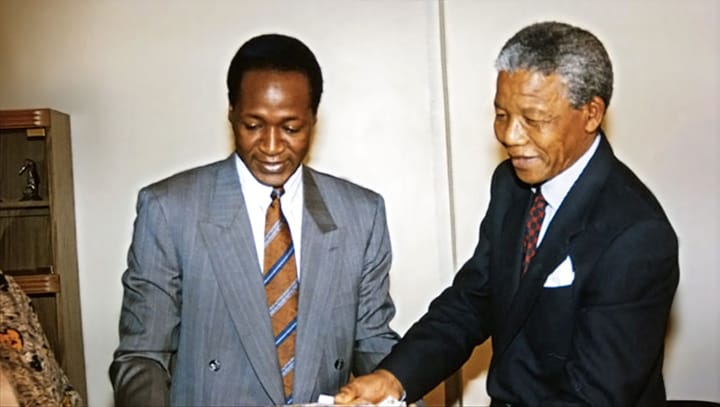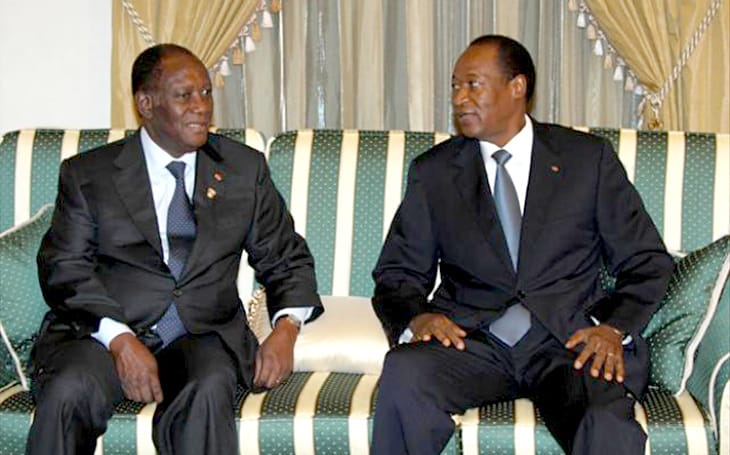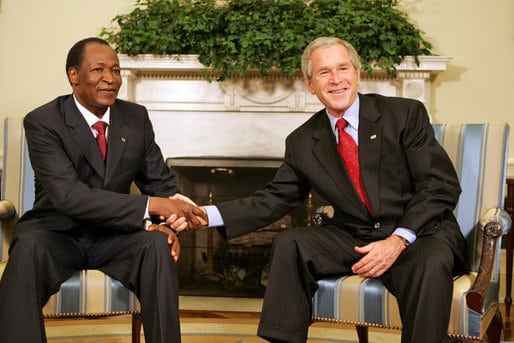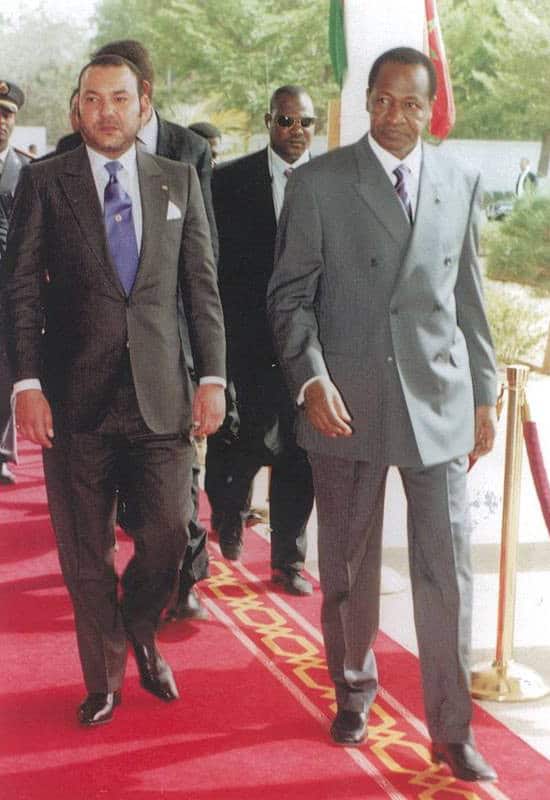Burkina Faso 1998-2014 : Africa’s key Mediator, Peacekeeper and Ally against the spread of Terrorism
With multiple -10 in total- successful mediations and several Ouagadougou peace agreements, Compaoré has experience and judgment in peace, security and conflict resolution that hardly anybody else can equal, playing a chief role in leading neighboring countries out of their worst crisis since independency (300).
Independent since 1960, it was not until the mid-80s that Burkina Faso drew international attention after Compaoré and Sankara launched their atypical revolution (301). During the rectification of the revolution, Compaoré renewed relations with its neighbours, getting the country out of its total isolation (302).
Presiding over a landlocked and resource-scarce nation since, he chose to turn Burkina Faso into a regional diplomatic power (303). Burkina Faso’s rising prominence on the African continent is the living proof of Compaoré’s dynamic foreign policy (304). From the late 1990s on, Ouagadougou emerged as the centre of the region’s diplomacy and peace initiatives (305).
Compaoré’s Conflict Mediations
President Blaise Compaoré has won international recognition for restoring calm and quietness in West Africa, as Facilitator of internal dialogue in Niger and Mali 1990-1991, in Chad 2003, Togo 1993 and 2006, in Côte d’Ivoire 2007-2010 as well as in Guinea 2009-2010 and again as ECOWAS mediator in Mali in 2012 until his exit from power (306).
He also helped to resolve the conflict between Eritrea and Ethiopia 1998 and to seek reconciliation in the Central African Republic 1998, in Liberia 1998-2000 and in Sudan 2008-2009 (307). Heading the Organisation of African Unity in 1998, his intervention with Libya lifted the international embargo imposed on the latter by the international community due to the Lockerbie affair.
1990-1991, in Niger and Mali: Compaoré, ECOWAS’ mediator, brokered a peace agreement between each administration and the Tuareg rebels (308).
1993: Togo’s President Eyadéma as well as the opposition called upon Compaoré to assist them as ECOWAS’ mediator in solving the deep internal conflict crisis that devastated the country when it adhered to the concept of national sovereign conference, an alternative – promoted by France – to elections by universal suffrage (309).
1998, the Central African Republic: Compaoré heading the Organisation of the African Unity, intervened during the mutinies that ravaged the country (310).
1998, Eritrea and Ethiopia conflict: when Compaoré was presiding the Organisation of the African Unity (OUA), his mediation skills also prevented escalation of the armed conflict between Eritrea and Ethiopia. Former President Bill Clinton even asked him to continue his implication in mastering this conflict (311).
1998, Libya and Lockerbie affair: The Boeing 747 blew up and crashed over Lockerbie, Dumfries and Galloway, on December 21, 1988, after taking off from London. All 259 people on board, and another 11 on the ground, were killed. Heading the Organisation of the African Unity (OUA), Compaoré’s personal intervention with Libya lifted in 1999 the international embargo imposed on the latter; the UN and EU sanctions were suspended when Muammar Gaddafi accepted to surrender the 2 Libyan suspects in the Lockerbie airliner bombing for trial and to pay $2.7 billion to relatives of the 270 victims of the attack.
1998-2000, Liberia: Although standing in stark contrast to the early 1990s, when the Compaoré government came under criticism for its position regarding the Liberian conflict supporting the rebel National Patriotic Front of Charles Taylor (312), from 1996 on Compaoré personally contributed to the return of peace in Liberia (313). Burkinabè troops assisted in the February 1997 preparations for the Liberian elections, and trained new armed forces (314).
President Compaoré – chairing the Organisation of the African Unity (OUA) – put Liberia on top of the agenda in 1998 during the OUA Heads of State Summit in Ouagadougou. In July 2000, Ouagadougou hosted a conclave of the Liberian crisis protagonists. Liberia’s President Charles Taylor refused to attend (315). But party leaders, secretary generals and other officers met in a by far much larger number in Ouagadougou and agreed on something different from what they had earlier agreed on in Bethesda, Washington DC (316). With the “Ouagadougou Declaration”, the conclave’s participants agreed on a cease-fire and the deployment of an interposition force by ECOWAS. They also agreed to put into place a transitional government without Taylor and to hold presidential and legislative elections, thus paving the way for a national reconciliation (317).
Compaoré attended the swearing-in ceremony of Ellen Johnson Sirleaf with a strong female delegation, representing various women organizations and cooperatives of Burkina Faso (318). Africa’s First female president’s last visit to Ouagadougou was on January 17, 2010, when she visited President Compaoré to thank him for his positive role in the Liberian peace process (319).
2005- 2006, Togo: A key mediator of the long socio-political crisis in that country, in the wake of the 2005 post-election violence that followed President Faure Gnassingbé’s controversial election, he was asked again to mediate the inter-Togolese dialogue (320).
The Global Political Agreement was signed on, August 20, 2006. The agreement included key topics like the electoral process, security and human rights aspects and good governance with a government of national unity, paving the way for the 2007 parliamentary elections, which took place without major incidents.
“ The result was an important breakthrough, consolidating Blaise Compaoré’s position as the top mediator in West Africa ”
International Security Studies (ISS) (321)
2007, Côte d’Ivoire: Already in 2002, after the failed coup of September, Compaoré facilitated the inter-Ivorian dialogue, easing political tensions between the different stakeholders – President Laurent Gbagbo, former President Henri Konan Bédié and former Prime Minister Alassane Ouattara. But the 2007 Ouagadougou Political Agreement, signed on March 4, by President Laurent Gbagbo and Guillaume Soro, Secretary general of “Les Forces Nouvelles”, was Compaoré’s biggest mediation success (322).
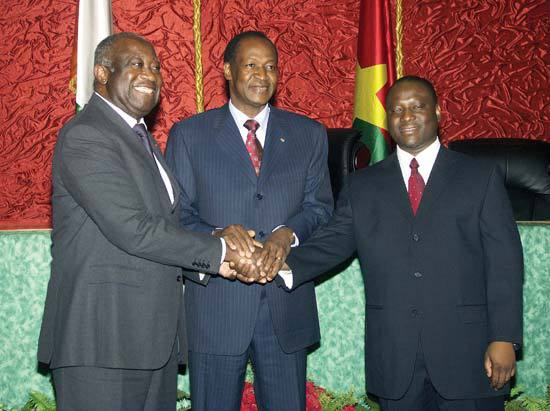
From left to right, President Gbagbo, the mediator and FN’s Secretary General Soro, Ouaga, March 4, 2007
Bound by strong historical and cultural ties, with more than 3 million Burkinabè living and working in Côte d’Ivoire among whom more than 1 million were already repatriated in Burkina as refugees, and given the strategic importance of Côte d’Ivoire for his land-locked country, Compaoré had all interest in reviving the peace process (323).
“ He succeeded where others before him -Thabo Mbeki, Kofi Annan and Jacques Chirac- had failed, pacifying a conflict that had disrupted the region’s biggest economy and ravaged thousands of human lives since September 2002 ”
International Crisis Group, 2013
The Ouagadougou Peace Agreement paved the way for the organisation of presidential elections in 2010, won by Alassane Ouattara.
2008-2009, Darfur: Recognition of Compaoré’s savoir faire was implicit in the nomination in July 2008 of Djibril Bassolé, the Burkinabè minister of foreign affairs, as the Joint African Union-United Nations chief mediator for Darfur.
“ Burkina Faso is proving that a country with limited resources can “punch above its weight” when it comes to making peace: Burkinabè battalions are deployed in rotation in Darfur, and the chief mediator for the AU-UN’s peace effort is from Burkina Faso (324) ”
Senator, John Kerry, 2009
In 2008, United Nations Security Council: President Compaoré chairing the U.N. Security Council directed the first high-level debate on mediation and conflict resolution (325). Burkina Faso obtained a seat of non-permanent member in the U.N. Security Council (2008-2009) and twice in the Peace and Security Council of the African Union (2006-2007) and (2008-2009) (326).
2009, Guinea: When the situation in Guinea turned nasty in 2009 after the massacre at the football stadium in downtown Conakry which left more than 150 people dead and dozens of women raped (327), Compaoré’s mediation decisively contributed to put an end to the country’s decades-long agony, leading to the first free elections held in the country since its independency (328).
2012, Mali: A peace agreement on respect of territorial integrity and rejection of religious extremism brokered by ECOWAS’ mediator Compaoré was signed on June 18, 2013 between the transitional government and representatives of separatist armed groups, paving the way for the 2013 presidential elections (329).
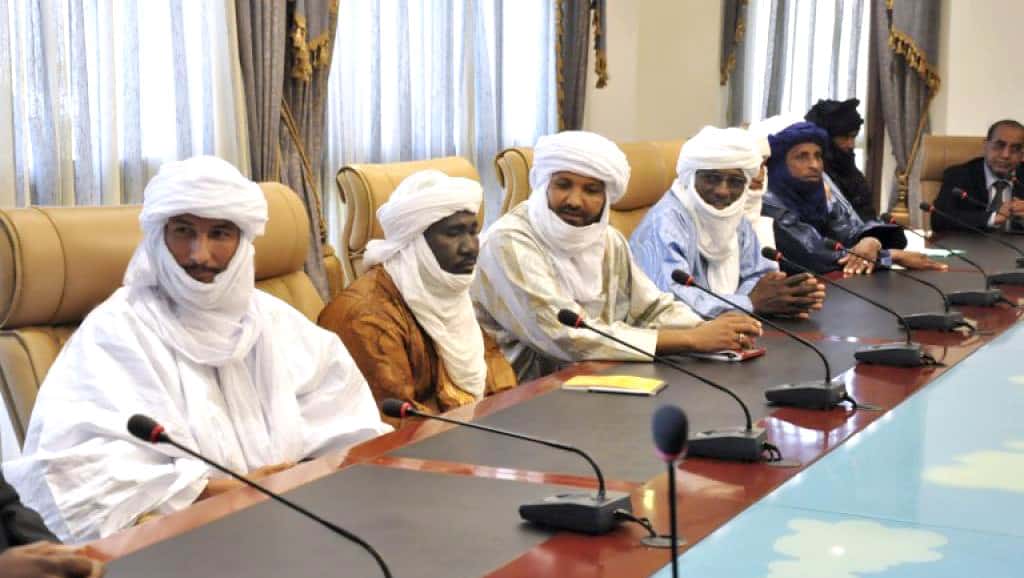
A peace agreement on respect of Mali’s territorial integrity and rejection of religious extremism was signed on June 18, 2013 in Ouagadougou
Compaoré’s mediation brought the separatist armed groups to abandon their quest for Independence for Azawad as well as their quest for extreme application of the Sharia Law, hence giving hope to many that the decades-long cycle of Tuareg uprisings may come to an end. But it was also gradually criticized by the Malian authorities who doubted Compaoré’s impartiality (330).
Compaoré was ECOWAS’ mediator in the Mali conflict until his exit from power on October 31, 2014 (331). He claimed that :
“ Political dialogue not force, is essential in tackling the root causes of the security crisis in northern Mali ”
Blaise Compaoré
He also urged the Malian transition authorities “to establish a national structure leading to direct dialogue with the rebels.” However, Compaoré was convinced that “the use of force was necessary to neutralize the extremists, terrorists and criminals operating in northern Mali, in terms of severity of the actions committed by these groups (332).”
September 2013, The International Criminal Court’s (ICI) prosecutor was seeking the involvement of President Compaoré in the resolution of the situation in Kenya (333). Compaoré had previously helped ICI to deploy its investigators in Mali.
Peacekeeping
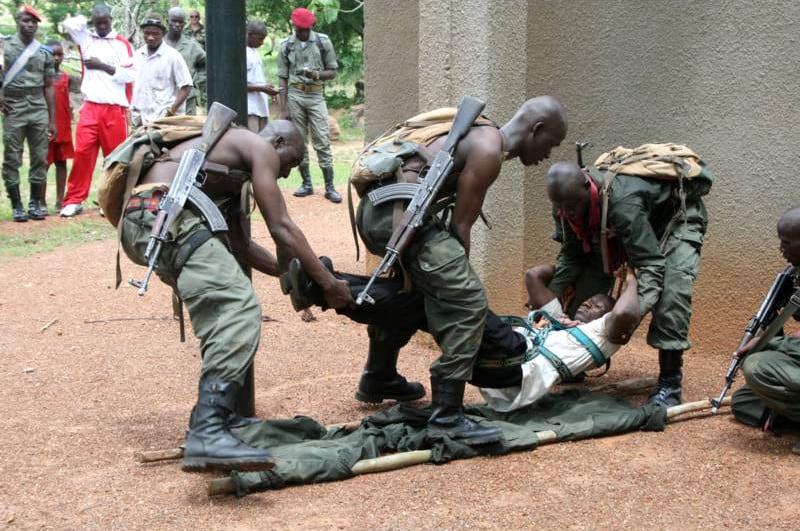
Burkina Faso was the 4th most important troops provider for peacekeeping operations on the continent
Since 1993, troops from Burkina Faso have been involved in peacekeeping efforts (334). Burkina Faso has contributed on a bilateral level to peacekeeping in Togo and Niger (335). In Liberia and the Democratic Republic of Congo (DRC), it intervened as part of ECOMOG (336). The deployment of military observers to the Democratic Republic of Congo took place according to the Law of 017-2000/1N of June 26, 2000 (337).
Burkina Faso participated within a multilateral framework peacekeeping effort in the Central African Republic, Burundi and Haiti (338). In the Central African Republic, the Burkinabè contigent’s first participation to the Peacekeeping Operations Mission (MISAB) took place according to the Law 009/97ADP of February 4, 1997.
Burkina Faso’s contribution to the United Nations Mission for the Referendum in Western Sahara (MINURSO) took place according to the Law 018/99/AN of May 4, 1999.
From 2009 on, Burkina has started to send UN-UA battalions on the ground in Darfur and Mali, deploying 8,445 men and women in several operation fields (339). During the last years, Burkina was the fourth most important troops provider for peacekeeping operations on the continent (340). It has also contributed with police forces (341).
Whereas Nigeria and Senegal were the leading peacekeeping forces, Burkina Faso, got the attention of the international community thanks to its professionalism and its discipline (342).
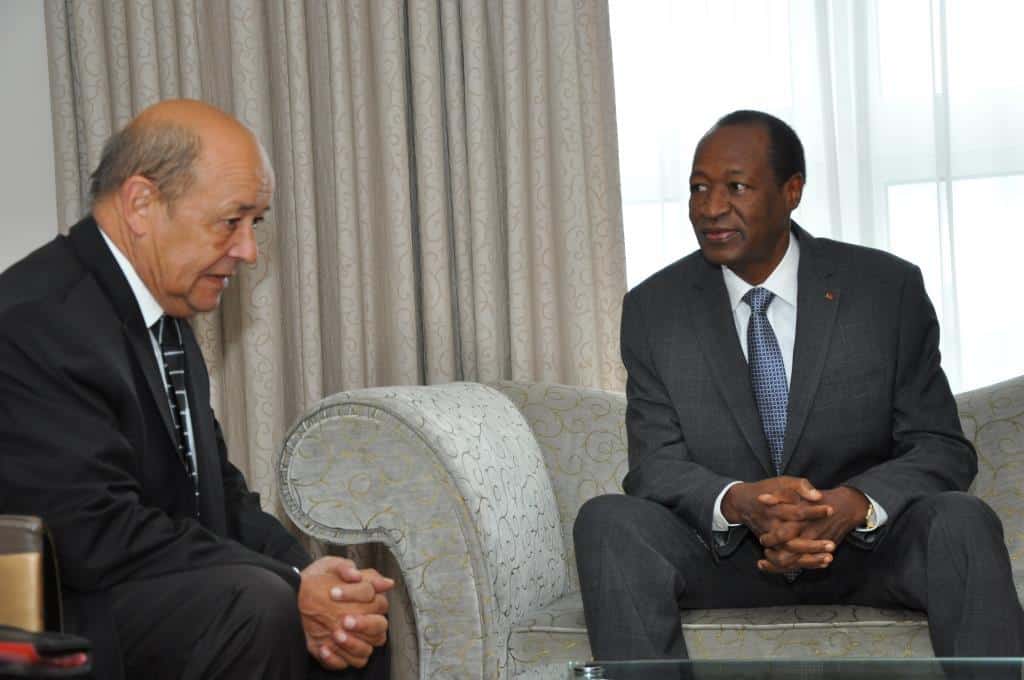
With Mr. Le Drian, Defense Minister of France exchanging views on the situation in Mali, Paris Aug. 15, 2014
Fighting terrorism
Compaoré was an important trans-Saharan ally of the West, quietly but effectively leading the fight against terrorism and criminality in the region. He and his closest advisors negotiated the liberation of several Western hostages held by Islamist groups in the Saharan Sahel region (343).
The BBC noted on October 31, 2014, the day Compaoré declared Burkina Faso’s Presidency vacant, that he was
” The strongest ally to France and the US in the region,” and that “despite his own history of backing rebels and fueling civil wars in the West African neighbourhood, more importantly, he used his networks to help Western powers battling Islamist militancy in the Sahel “
BBC, Oct 31, 2014
Burkina Faso also provided access to a detachment of French special operations forces and to United States’ Joint Special Operations Air Detachment, which conducted surveillance missions across the Sahel (344).
“ We need to move beyond the mindset of throwing money and military at problems. Instead, we should start a dialogue to have a better understanding of the specific problems the region and countries are confronted with.
Internal political conflict and weak institutions in many of these African countries strongly underpinned the rise of terror and crime. Therefore, African states must ensure that, within their own national territory, appropriate and inclusive political and economic governance is established. If not, the State will fail ”
Blaise Compaoré, U.N. meeting on the Sahel, 2013
Burkina Faso in 2017:
After the fall of the Compaoré regime and the reorganization of the Burkinabé armed forces, Burkina Faso – which had played a major role against terrorism – gradually became the target of attacks in its northern region. Many have been killed since the first attack in the capital city on 15 January 2016. On February 28, 2017, French newspaper Le Figaro wrote that Burkina Faso has become “a new breeding ground for the Islamist insurrection movement.” In the north, the situation is critical. Teachers were killed in front of their pupils by terrorists, simply for teaching in French and not in Arabic as imposed by the extremist movements. Many schools are deserted today in this region bordering Mali. The teachers and the populations who live in fear of terrorism feel abandoned by the State. Read article.
” Yesterday, preserved from terrorism under Blaise Compaore, the country is today confronted with the jihadists of the subregion but also with a local Islamist insurrection “
Le Monde, Aug. 15, 2017
According to this French newspaper, in only three months – June, July and August 2017, – Burkina Faso has suffered 20 attacks that killed nearly 50 people. Read article.
U.S. Relations
U.S.-Burkinabè relations steadily improved along with President Blaise Compaoré’s major mediation efforts that have enabled fellow Africans to resolve issues among themselves (347). When Mr. Compaoré made his first visit to the White House on July 16 2008, former President George W. Bush personally thanked him for being.
“A constructive force for peace and stability in the region, sharing the goals of advancing democracy and human rights in Africa, especially in Zimbabwe and Sudan (348)”
George W. Bush, July 16, 2008
Burkina Faso’s policies were highly recognized by the U.S. in 2009 granting a major MCC Compact, totalling $484 million invested today in land irrigation, roads, agricultural reform and education (349). In 2013, military cooperation between the United States and Burkina Faso was mutually considered as exemplary and dynamic as stated again during Compaoré’s meeting with Secretary for Defense Charles Hagel, on September 23, 2013 (350). In 2014, the United States was Burkina’s most important development partner (351).
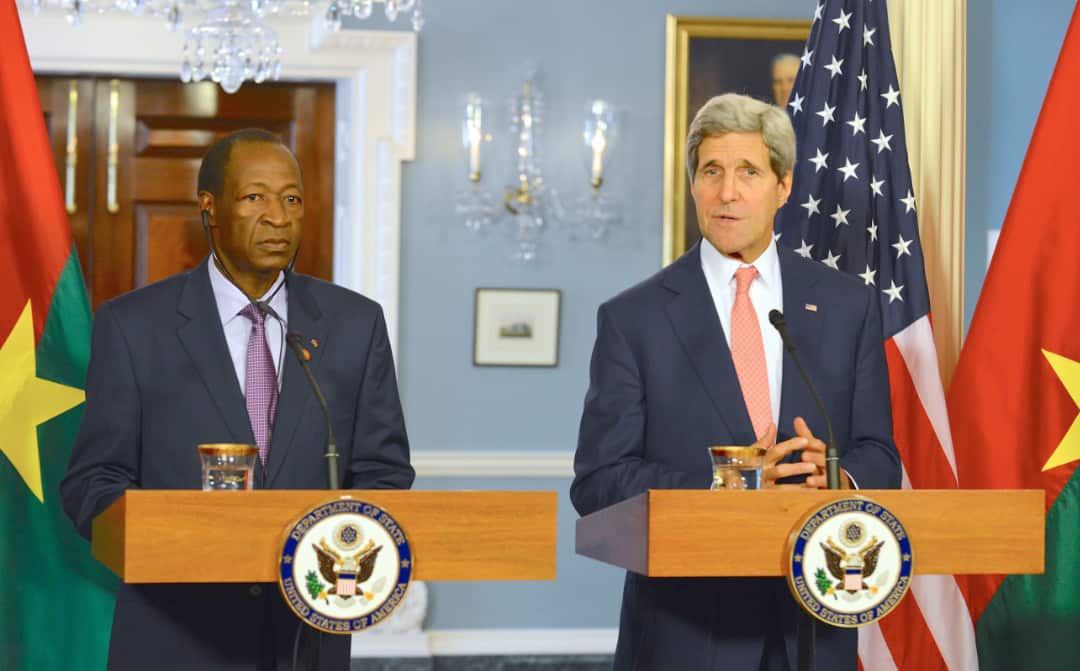
In 2013, military cooperation between the United States and Burkina Faso was mutually considered as exemplary and dynamic
Blaise “branding” Burkina
Over the years, Compaoré has successfully branded Burkina through his peace efforts (352). His mediation efforts have strengthened relations with development partners and have eased access to business opportunities for Burkinabè entrepreneurs in the region and international top functions for Burkinabè officials.
“ His diplomatic prestige has also allowed him to place many of his men in regional and international institutions, hence increasing the country’s influence abroad” (353) ”
International Crisis Group, 2013
Ouaga 2000, the thriving new metropolitan district entirely conceived in the 1990s by Compoaré’s vision of the capital’s development in the 21st century, has increasingly hosted several major international meetings and conferences such as the 1996 France-Africa summit, the 1998 Organization of the African Unity (OUA) summit, the 2005 summit of Francophone countries as well as the 1998 African Cup of Nations, a mayor worldwide football event (354).
Many other conferences with Heads of State or with other prominent leaders were frequently held in the capital (355). Between 2000 and 2002, four high-level meetings took place in Ouagadougou. In November 2000, Blaise Compaoré opened the 27th Annual Meeting of the Islamic Development Bank. A month later, Compaoré chaired the International Conference on the Protection of the Ozone Layer.
In September 2001, two days after the terrorist attacks in the United States, he said at the 106th Inter-Parliamentary Conference in Ouagadougou that it was “more than ever imperative that all countries, in a consensual effort, cooperate to eradicate terrorism and the causes in which it finds its origins.” And in November 2002, Ouagadougou hosted the Summit of Heads of State and Government of Africa and Europe.
Best ICT Practices: Ouagadougou has also become the spot where since 2008 Microsoft used to organize a yearly African conference on best ICT practices (356). On October 25,2011, Compaoré was nominated Chairman of the International Multilateral Partnership Against Cyber Threats (IMPACT), which serves as the executing arm of the ITU (the UN specialised agency for ICT), in the area of cyber security (357).
